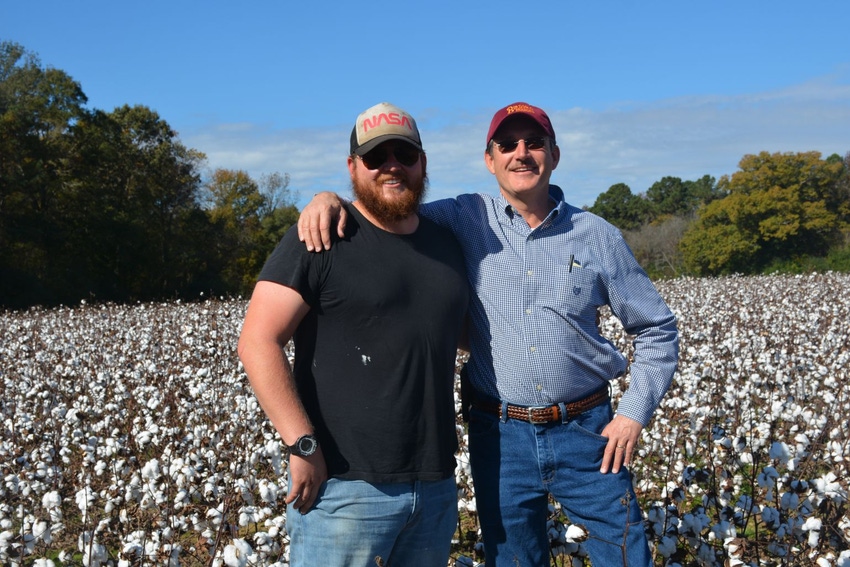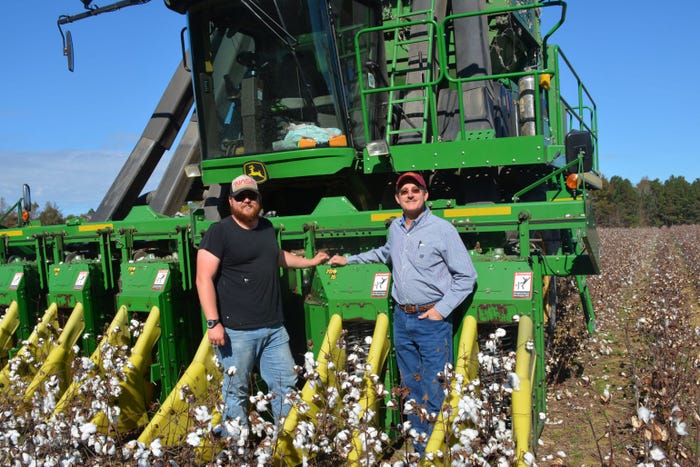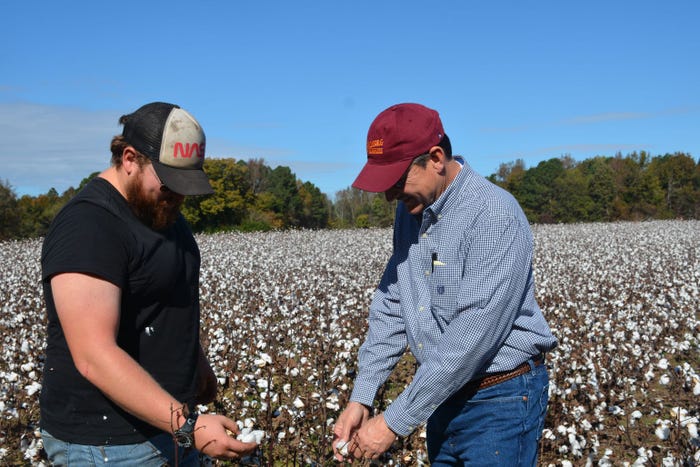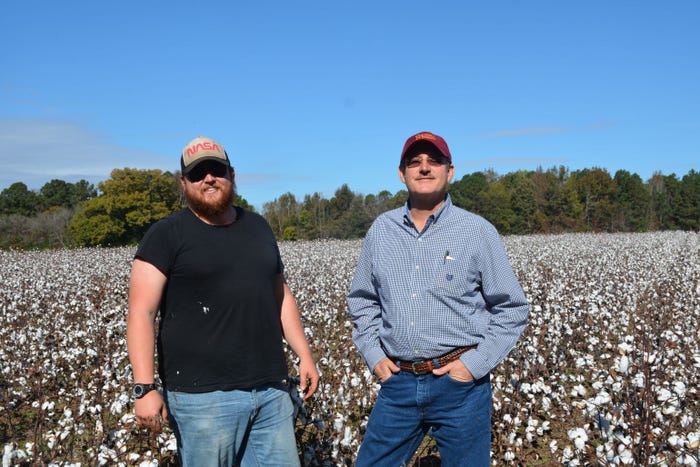
For as long as he can remember, David Dunlow has considered himself first and foremost a cotton farmer.
Sure, he has enjoyed success producing peanuts, soybeans, wheat, corn and other crops in North Carolina’s Northampton and Halifax counties, but cotton has always been his first love. Because of his passion and commitment to cotton, Dunlow has taken on active roles with both the National Cotton Council and the Southern Cotton Growers. Dunlow’s son William also shares his father’s passion for cotton and has been a partner in the operation since 2014.
“I’ve grown cotton my entire career and I’m passionate about it,” Dunlow says. “I spend more time on cotton than soybeans. Cotton takes a lot of management, although peanuts take a lot of management too. It’s a lot of work, but I enjoy it.”
Dunlow’s grandfather Colar Merman Dunlow farmed in Virginia, but his father M.C. Dunlow moved to North Carolina in 1956 and started farming near Gaston. Dunlow was born in 1960 and started farming fulltime with his father after graduating high school in 1978.
“I became a partner in the farm with my mom and dad in 1985. Dad died in 1992 and mom told me that she has been farming all her life and had had enough. She said I could take over and just pay her land rent. I took it all on my own in 1992 and have been chipping away ever since,” Dunlow says.
Today, David Dunlow, wife Debra and son William, 26, are in a partnership and farm 5,000 acres. Cotton is their top crop at 3,800 acres. They grow 400 acres of peanuts with the rest of the land planted to soybeans. “We’ve always grown cotton, and there certainly have been a lot of changes over the years,” he says.
“Dad had people who hand-picked and then we went to one-row pickers,” he says. “I ran a John Deere 99 two-row cotton picker which I mean was slow. We’ve gone from two-row pickers to four-row pickers to six-row pickers, from little trailers to big trailers to module builders to the rolls. We’re much more efficient now.”
However, with the improved efficiency comes higher costs.
“Each time they improve something, they charge you more for it. It gets more expensive all the time,” Dunlow says. “The new technology in cotton seed is wonderful and we couldn’t have the higher yields without it, but I am concerned about the amount of money we’re spending on technology fees. My concern is that we might be pricing some of our cotton farms out of the market.”
For the cotton farmer who averages 1,200 pounds per acre with the new seed technology, the higher yields will often cover the higher tech fees. However, Dunlow notes that the higher tech fees are more of a challenge for farmers who average 850 pounds per acre or less, year in and year out.
“We’ve expressed our concern with some of the major companies through the American Cotton Producers. We’re talking and they are listening. I feel like we will work our way through this,” Dunlow says.
Fortunately this year, the Dunlows harvested a banner cotton crop. “We saw lots of two bale cotton and the quality was wonderful this year,” he says. “’I’m not saying it’s the best crop I ever had, but it certainly is one of the best crops I’ve ever had. It’s been extraordinary, and the peanut crop is the best we’ve ever had. It graded really well and we had some great yields. We were absolutely blessed this year.”
Dunlow certainly welcomes the improved quality and two-bale yields after a weather-damaged 2016 crop due Hurricane Matthew, and a disappointing 2015 crop due to wet weather at harvest. “The quality is wonderful this year. We’re getting four and five cents premiums over loan value, which is extraordinary.”
Dunlow estimates his peanut yields at 3,800 pounds per acre with some fields averaging 4,000 pounds per acre and other fields approaching 5,000 pounds per acre. Soybeans are looking good too, averaging 48 bushels per acre.
As for his success on the farm, Dunlow credits good employees, a good consultant and helpful vendors. “I credit my employees number one,” Dunlow explains. “If you have good employees who are engaged and concerned, try hard and do a good job, it makes it so much easier. I can’t run all six tractors myself. You have to have people who are dedicated.”
The operation includes a total of 15 people, which includes David, Debra and William Dunlow, and two ladies who work in the office. “Every morning we have a meeting in the shop. We talk about the day’s plans and what our goals are. We always ask for questions and comments and everyone is involved in making decisions. We make sure everyone is pulling in the same direction,” Dunlow says.
In addition to guidance from crop consultant Daniel Fowler of Roanoke Rapids, the Dunlows turn to N.C. State University’s cotton agronomist Guy Collins for guidance. “We lean on Guy pretty heavily and Northampton County Extension agent Craig Ellison helps us a lot,” Dunlow says. “It’s not what I know, it’s who I know. We gather all of these resources and information and try to make the best decisions we can.”
Since joining the operation in 2014 after graduating from N.C. State University with a degree in agriculture in 2013, William has taken on more of the day-to-day management of the farm. He handles much of the marketing and chooses the varieties the family will grow.
“It’s a good relationship that we have,” William says. “Dad lets me fall and he gives me guidance. It’s like bumpers in a bowling alley. If you have the bumpers, you won’t get your ball in the gutter. You can keep moving in the right direction.”
When it comes to variety selection, William says they “live by diversity.” Spreading the risk over multiple varieties is vital. This year they planted eight different varieties.
“Certain varieties have failed. The varieties that you thought were tried and true failed because of growing conditions. The more you limit your risk, the better you do. Of the eight varieties we planted, some were full-season, some were mid-season and some were short season. You’re not going to hit a grand slam all of the time, but you’re going to do okay with a broad spectrum of cotton varieties. Some will do really well and some won’t, but at least you don’t have all your eggs in one basket.”
William evaluates varieties by how they perform on marginal land, how they do on good land, how they tolerate drought, and how they respond to growth regulators. “The biggest thing is not how they are going doing in ideal conditions, but how they are going to do under adverse conditions,” he says. “Last year’s best variety may be this year’s worst variety.”
N.C. State’s OVT (Official Variety Test) is a big help. “You need to evaluate how varieties perform over different types of land. What works for me doesn’t always work for everybody else,” William says.
Since William joined the operation, the Dunlows have switched to no-till with triticale cover crops over much of their cotton and soybean land, although they do like to strip-till every third year. “We’re starting to see where it’s paying off. It’s better for the land and it’s working for us. It gives us good germination, better than strip-tilling, which is surprising to me,” William notes.
Like his father, William has a passion for cotton. “Every Sunday after church when I was a kid, we would hop in the truck and go look at the crop. I loved it. I played sports after school for a while, but then I decided to come back to the farm after school instead,” he says.
William is happy to be on the farm, working with his dad. “It’s been a roller coaster ride, but it’s been fun,” he says. “Commodity prices are smoothing out a little more and things are becoming more stable. It’s a good time to be young in the cotton industry.”
With William running much of the day-to-day operations, David has more time to devote to the National Cotton Council and Southern Cotton Growers. He is chairman of Southern Cotton Growers and wrapped up his service as president earlier this year. He also serves on the board of the National Cotton Council.
Dunlow has been actively involved in cotton organizations for 17 years now. He says Billy Carter, the well-known and respected North Carolina cotton farmer and leader who died on New Year’s Day 2011 after injuries from a car accident, was his mentor who encouraged him to get involved. Dunlow says his fellow Northampton County cotton farmer and friend David Grant, who is also actively involved in industry leadership roles, helped open doors for him to get more involved.
“I learned a lot and made a lot of good friends. I learned how super-important these organizations are and how they fight for the cotton farmer behind the scenes,” Dunlow says.
In addition to son William, David and Debra have a son Daniel, 23, who graduated from Tisch School of the Arts at New York University and is an actor and founder of the Green Room 42, a popular cabaret in New York City. Daughter Elizabeth, 20, is a student at East Carolina University, majoring in Event Planning and Hospitality Management.
“Cotton certainly has been both challenging and rewarding throughout my career,” Dunlow says. “Through the good times and the bad, the cotton industry perseveres and will manage the storms ahead. We have great organizations that support us and great people. It’s because we so strongly believe in the cotton industry that we keep doing this and stay with it.”
Both David and William agree that they will keep their commitment to cotton, an industry and crop they both love.

William is happy to be on the farm, working with his dad.

William and David Dunlow emphasize spreading risk by planting multiple cotton varieties. This year, they planted eight different varieties.

William and David Dunlow say this year’s cotton crop may be one of their best ever in terms of yield and quality.
About the Author(s)
You May Also Like






